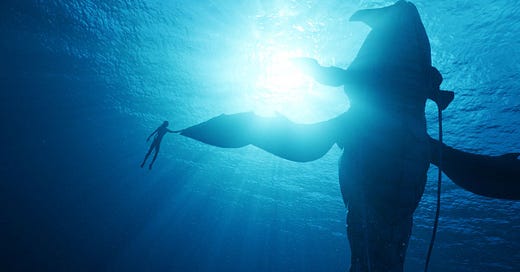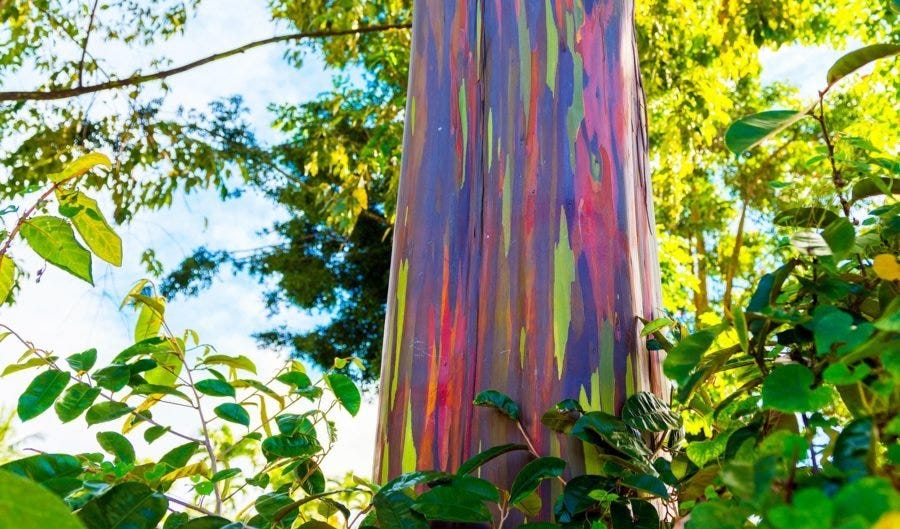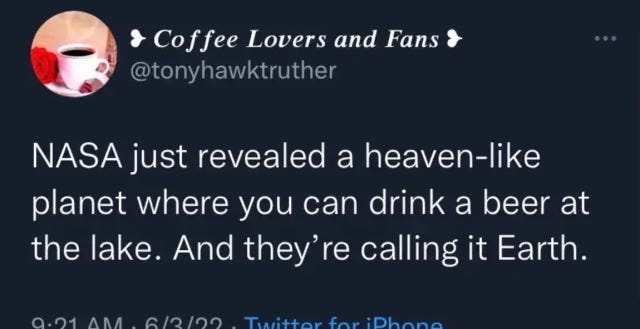Over the weekend, having already seen it once by myself,1 I brought my wife to the theater to watch Avatar: The Way of Water. I’ve barely gone to the movies at all in the last three years, for obvious reasons, so it was a real treat to love a film so much that I had to go back for more.
It feels odd to say about a big-budget blockbuster, but I genuinely think this movie, like its predecessor, is an important and subversive one. I mean this in a very real and substantive way, not in a “we showed half a second of a gay kiss in a Marvel movie that can be easily cut out for international audiences” way. You can’t cut out what’s important and subversive about The Way of Water because its entire premise is a loud and proud condemnation of imperialism, militarism, and capitalism.
The film’s world of Pandora is exquisitely constructed and visually stunning. On the second viewing, no longer caught up in wondering what was going to happen, I was able to take in so much more of the splendor that James Cameron crafted.
But what’s important to note is that so many of the things that make the world of Avatar special are simply new representations of phenomena that already exist right here on Earth. This is not a lack of imagination on Cameron’s part but a core part of the message of these films: that we are already on Pandora, that the corporate colonists and plunderers are already well on their way to destroying all that is good and green on our planet, and that solidarity and resistance against these world-destroying forces are not optional.
There are already mycorrhizal fungi that link vast networks of trees together, giving the forest an intelligence and a way to communicate with itself. The pioneering mycorrhizal research of Suzanne Simard inspired the Home Tree of the first movie, as well as the ability of the Na’vi to link themselves physically to the network of consciousness of most other living beings. Human bodies, if left to natural processes, return their nutrients to the earth. I’m coming to believe that they return other things, too—memories, feelings, essences, things that can be sensed or perceived if one pays close enough attention. That recycling of the spirit, bioluminescence, whalesong, non-human (and non-animal) intelligences — these are all magnified and beautified in Cameron’s world, but their essence is something we can all access and experience right here on Earth.
Look at Eucalyptus deglupta here. Holy shit!
This is a real tree that just exists, on this planet. Sometimes I think social media has dulled my capacity for awe; there are so many Instagram and Twitter accounts dedicated to highlighting the funkiest animals and plants on Earth that it’s possible to start finding them commonplace, to become desensitized to these marvels. But when I let myself take five seconds to think about the rainbow eucalyptus or giant squid or whatever else: Holy shit! Not much else I know how to say. The world is full of dholes and duikers and tamanduas and fisher cats, not to mention more commonplace wonders like roses and redwoods and housecats, and all manner of other things that should be nothing but an endless source of wonder. From that wonder should come an urgent need to protect them, and each other, from the ravages of the built world that we all live under.
In my mind there’s no more dramatic example of this than the whale. Impossibly large, impossibly intelligent, with memories and songs and languages all their own. I get emotional just thinking about them. The film depicts whale-like creatures on Pandora, called the Tulkun, and they are both spirit-siblings of the Na’vi and relentlessly hunted by human colonists for the precious fluid stored in their brains. The Tulkun are at the center of some of the most affecting scenes in the movie, as they form bonds with some of the main characters and are opportunistically brutalized by others.
You’d be hard-pressed to pick a better microcosm of the death drive inherent to capitalism than whaling. In the film, the Tulkun hunters go after mothers nursing calves because the calves are slow and their mothers will not abandon them, making them easy targets. In real life the strategy was, if possible, even more barbaric: whalers would harpoon the calves themselves, knowing that whales are intensely social and fiercely protective. By wounding one calf they could bring a herd of adults into range. (You can probably already sense the issue with that business model, the same issue that undergirds fossil fuel extraction and timber production and all manner of other more socially acceptable forms of ecological destruction. Forget Margaret Thatcher: the problem with capitalism is that eventually you run out of other people’s resources, and your own.)
Philip Pullman has written often about an idea that shares an animating principle with the world of Avatar, of abandoning the idea of the Kingdom of Heaven in favor of a “republic of Heaven” right here on Earth, where we can treasure our own lives and the lives of other creatures. He explains:
What I’m referring to is a sense that things are right and good, and we are part of everything that’s right and good. It’s a sense that we’re connected to the universe. This connectedness is where meaning lies; the meaning of our lives is their connection with something other than ourselves.
…[Christianity] has the terrible defect of libeling — one might almost say blaspheming against, if the notion had any republican meaning — the physical universe; of saying that this world is just a clumsy copy of a perfect original we can’t see because it’s somewhere else.
I’ve often cited the philosopher Martin Hägglund in this newsletter based on similar principles.
I’m trying to show that it’s not just that eternal life is unattainable. It’s actually undesirable, because if you remove the possibility of death you also remove life, if you remove the possibility of grief you also remove joy.
…One thing that’s often said about Marx and Marxism is that we are just replacing heaven with communist paradise, a state in which all problems are resolved. What I’m trying to show is that socialism is not a state in which all problems are resolved. It’s a state of existence where we can fully own the question of what to do with our time, in order to do justice to our fragility, not to overcome it.
…To lead a free life, it’s not enough that we have formal rights to freedom. We must also have access to the material resources and the forms of education that allow us to own and engage the question of what we ought to do with our time together. What really is our own is not property or goods, it’s the time of our lives.
It delights me to no end that there are so many common, resonant themes across the works I love. (Or maybe I have the causation backward and I love them because of these commonalities.) As I look at them side by side the lines between Pullman’s ideas and Hägglund’s start to get blurry; either one of them might have written the following sentiments (although it was Pullman):
We have to realize that our human nature demands meaning and joy…to accept that this meaning and joy will involve a passionate love of the physical world, this world, of food and drink and sex and music and laughter, and not a suspicion and hatred of it; to understand that it will both grow out of and add to the achievements of the human mind.
…At the furthest extent, this sense of delight in the physical world can blend into a sort of ecstatic identification with it.
I am drawn to stories that advocate for the abolition of our worst, most self-destructive hierarchies and systems, and seek to inspire people to pay attention to and fight for all the good that’s still left in the world we do have. I live for what Pullman calls this ecstatic identification with it. Because the promise of capitalism and the dream of space colonization and the dream the Kingdom of Heaven are all one and the same: a turning away from all that makes our human lives in our human world so precious, and a demand that we accept injustice and immiseration in service of a pipe dream of elsewhere that allows a small, elite group to maintain a stranglehold on life here. Americans purport to love democracy, but not one of us has actually ever lived under one; it’s a savvy bit of marketing—or as it’s more honestly called, propaganda—that hundreds of millions of people are convinced that the opposite is true.
It doesn’t have to be. We are on Pandora, and we can build the republic of Heaven right here.
Thanks, as always, for reading. I’ll talk to you next time.
-Chuck
PS - If you liked what you read here, why not subscribe and get this newsletter delivered to your inbox each week? It’s free and always will be, although there is a voluntary paid subscription option if you’d like to support Tabs Open that way.
Going to the movies alone, like going to a concert alone, feels weird and distracting for about five minutes. And then it’s great. More people should do it








Your vision is existential and your understanding of life is wizardly, but without magic or mystical powers. Your writing is Holy shit! Awesome.
When Jesus talked about how a rich man trying to get into heaven is like a camel trying to pass through the eye of a needle, I think he meant that until we put down the baggage of our egos and all the behaviors driven by our belief in the myth of our own separateness, we'll keep failing to understand that the kingdom of god is right here, right now.
Also, this is a really nice thought: "I’m coming to believe that they return other things, too—memories, feelings, essences, things that can be sensed or perceived if one pays close enough attention."